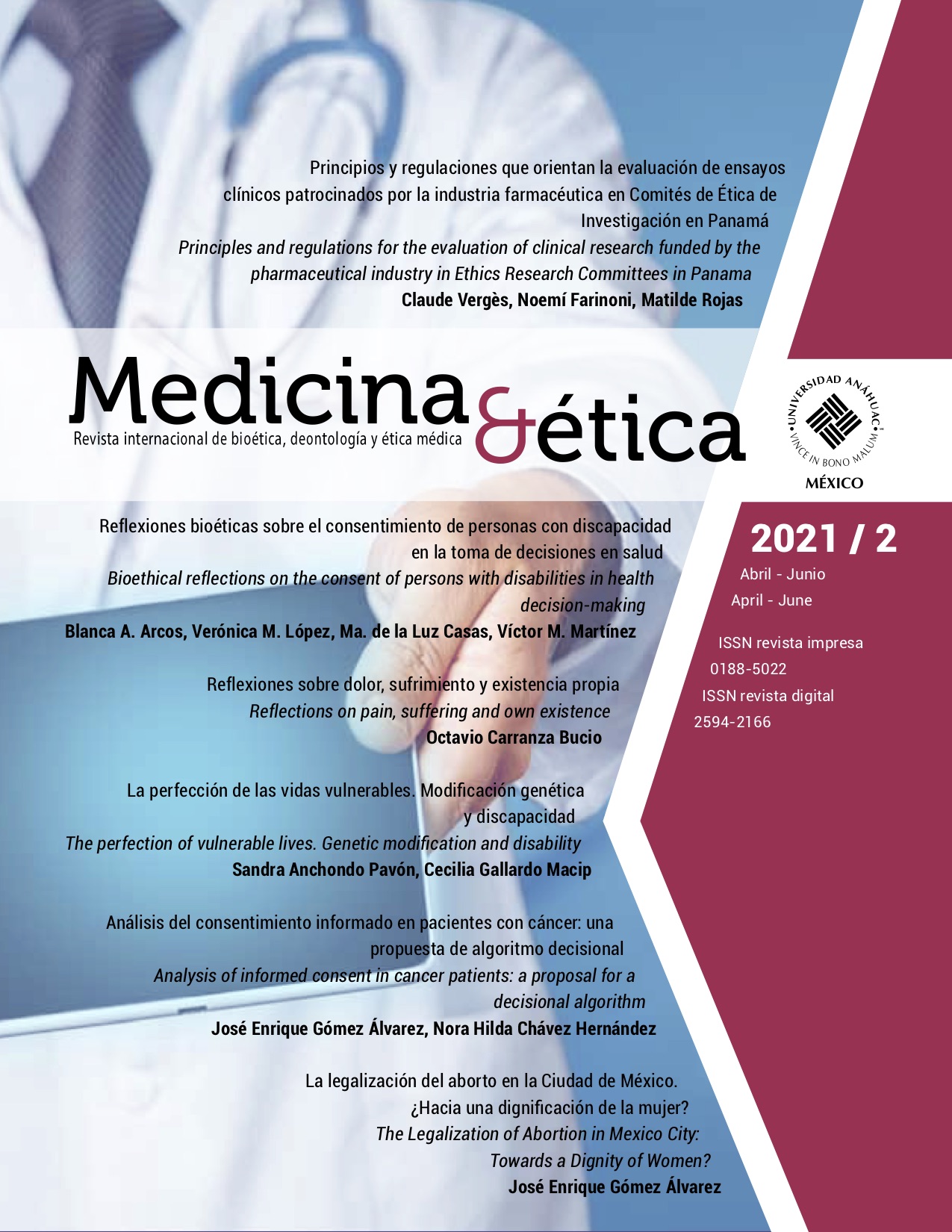Analysis of informed consent in cancer patients: a proposal for a decisional algorithm
Main Article Content
Abstract
One of the hindrances in the care of cancer patients is the possibility of them not collaborating in their treatment. Based on conceptual analysis and study of two cases, we propose an improvement on the quality of this procedure in the IMSS outpatient Oncology Clinic 180 of the IMSS.1 The clinical literature reveals several limitations of patients when consenting to treatments, stress being frequently mentioned. Moreover, in the cases analyzed, in addition to the aforementioned elements, appears previous wrong information about the treatment and the severity of the disease. From the data found, a decisional algorithm was designed indicating moments that can facilitate and allow informed consent. It is concluded that consent must be given throughout the entire process, with the decision-making algorithm being a proposal for its improvement.
Downloads
PLUMX Metrics
Article Details

This work is licensed under a Creative Commons Attribution-NonCommercial-ShareAlike 4.0 International License.
Medicina y Ética is distributed under a Creative Commons License Atribución-NoComercial-CompartirIgual 4.0 Internacional.
The author keeps the property rights with no restriction whatsoever and guarantees the magazine the right to be the first publication of the work. The author is free to deposit the published version in any other medium, such as an institutional archive or on his own website.
References
Disponible en: https://www.researchgate.net/publication/320385362_Distres_emocional_y_problemas_
asociados_en_poblacion_oncologica_adulta https://doi.org/10.5209/psic.57081
2. Allende S, Verástegui E, Mohar A, Meneses A, Herrera S. La pieza perdida en la medicina actual: atención domiciliaria a pacientes paliativos oncológicos. Salud Pública Méx. 2016; 58: 229-233. [Consultado en febrero de 2019]. Disponible en: http://www.scielo.org.mx/pdf/spm/v58n2/0036-3634-spm-58-02-00317.pdf
3. Verástegui E, Allende S. Aspectos éticos en pacientes con cáncer avanzado en cuidados paliativos. Gaceta Mexicana de Oncología. 2013; 12 (4): 250-255.
4. Ataupillco Y, Sánchez O, Saravia F. Efectividad de un programa de consejería de enfermería en las estrategias de afrontamiento en mujeres con cáncer de mama (Tesis de especialidad). Lima, Perú: Universidad peruana Cayetano Heredia; 2016. [Consultado en febrero de 2019]. Disponible en: https://alicia.concytec.gob.pe/vufind/Record/RPCH_
0f86aa40c283d51419f524376bf5357d/Details
5. Rubiales A, Del Valle M, García C, Garavís M, Vecino A, Hernansanz H, López F. Información al enfermo oncológico: los límites de la «verdad tolerable». Cuad Bioet. 1998; (1): 388-401. [Consultado en febrero de 2019]. Disponible en: http://aebioetica.org/revistas/2000/3-4/43/388.pdf
6. Vigo A. Ética general. DuocUC. Centro de Ética Aplicada. Pontificia Universidad Católica de Chile. S. f. [Consultado en noviembre de 2020]. Disponible en: https://www.academia.edu/35224318/Etica_General_Rodolfo_Vigo
7. Valderrama M, Sánchez R. Trastornos de ansiedad y depresión en relación con la calidad de vida de pacientes con cáncer de mama en estadio localmente avanzado o diseminado. Rev Colomb Psiquiat. 2017; 47(4): 211-220. [Consultado en febrero de 2019]. Disponible en: http://www.scielo.org.co/scielo.php?script=sci_-
abstract&pid=S0034-74502018000400211&lng=en&nrm=iso https://doi.org/10.-1016/j.rcp.2017.04.003
8. Moral J, Melina M. Pensamiento psicológico. 2014; 13 (1): 7-25. [Consultado en febrero de 2019]. Disponible en: http://www.scielo.org.co/pdf/pepsi/v13n1/v13-n1a01.pdf
9. Cisneros F. Proceso de atención de enfermería. Universidad de Cauca. [Consultado en febrero de 2019]. Disponible en: http://artemisa.unicauca.edu.co/~pivalencia/archivos/ProcesoDeAtencionDeEnfermeria-PAE.pdf

